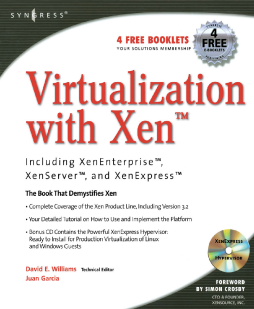
BOOK
Virtualization with Xen(tm): Including XenEnterprise, XenServer, and XenExpress
(2007)
Additional Information
Book Details
Abstract
Complete Coverage of Xen, Including Version 3.2
Virtualization with Xen is the first book to demonstrate to readers how to install, administer, and maintain a virtual infrastructure based on XenSource’s latest release, Xen 3.2. It discusses best practices for setting up a Xen environment correctly the first time, maximizing the utilization of server assets while taking advantage of the fastest and most secure enterprise-grade paravirtualization architecture. It covers both basic and advanced topics, such as planning and installation, physical-to-virtual migrations, virtual machine provisioning, resource management, and monitoring and troubleshooting guests and Xen hosts.
* Explore Xen’s Virtualization Model
Find a complete overview of the architecture model as well of all products: Xen 3.0 , Xen Express, XenServer, and Xen Enterprise.
* Deploy Xen
Understand the system requirements, learn installation methods, and see how to install Xen on a free Linux distribution.
* Master the Administrator Console
Learn how to use the command-line tools and the remote Java-based consoler that manages the configuration and operations of XenServer hosts and VMs.
* Manage Xen with Third-Party Tools
Use products like openQRM, Enomalism, and Project ConVirt to manage the VMM.
* Deploy a Virtual Machine in Xen
Learn about workload planning and installing modified guests, unmodified guests, and Windows guests.
* Explore Advanced Xen Concepts
Build a Xen Cluster, complete a XenVM migration, and discover XenVM backup and recovery solutions.
* See the Future of Virtualization
See the unofficial Xen road map and what virtual infrastructure holds for tomorrow’s data center.
* See Other Virtualization Technologies and How They Compare with Xen
Take a look at the different types of server virtualization, other virtual machine software available, and how they compare with Xen.
- Xen has the lead in the open-source community; now distributed as a standard kernel package for Novell’s SLES 10 and Red Hat’s RHEL 5 and Fedora Core 6 Linux distributions
- Covers installation, administration, management, monitoring, and deployment planning and strategies
